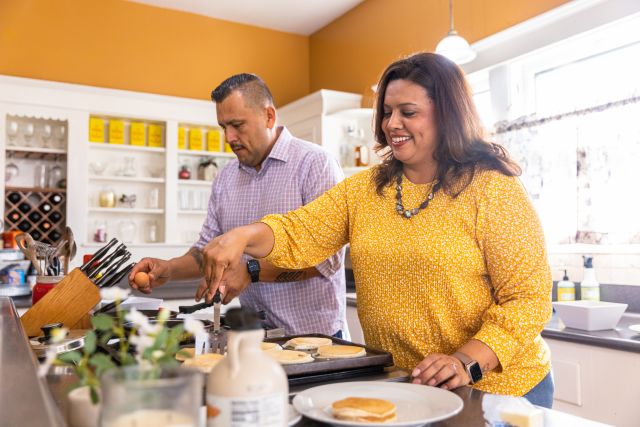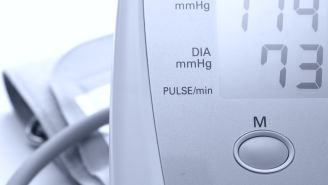Updated on February 12, 2024.
If you have high blood pressure (also known as hypertension), you may be aware that the foods you eat (or don’t eat) can affect your blood pressure. What you may not know is just how important a role your diet plays.
“In general, the majority of the high blood pressure in this country is classified as essential hypertension,” says Robert Bennett, MD, a cardiologist at Saint Agnes Medical Center in Fresno, California. “That means there's no obvious cause for it. But we think the majority of it is due to lifestyle, in particular your diet.”
While a number of factors raise a person’s risk of atherosclerosis (hardening of the arteries), stroke, and heart disease, managing blood pressure is a first step in helping to reduce these risks.
The American Heart Association (AHA) recommends that people eat a diet rich in fruits, vegetables, whole grains, lean meats, and fish to keep blood pressure in the healthy range. Following the DASH diet (Dietary Approaches to Stop Hypertension) is one easy way to stay on track. It’s an eating plan that includes foods like these and recommends limits on other foods. “The DASH diet has been shown to be effective, from a scientific standpoint,” notes Dr. Bennett.
Knowing what to eat to lower blood pressure is one thing. But there are certain foods that can elevate your blood pressure more than others. Here are the top foods to avoid, according to Bennett.
Salty foods
Volumes of research have shown this: A high-sodium diet (that is, one that contains a lot of salty food) is bad for your heart.
The AHA recommends that people consume no more than 1,500 milligrams (mg) of sodium (that’s just under 3/4 teaspoons of salt) per day for healthy blood pressure levels. But most Americans take in over 3,400 mg of sodium each day, more than twice the recommended serving.
Where does all this sodium come from? “A majority of the sodium we get, at least 75 percent, is from processed foods, prepackaged foods, and eating at restaurants,” says Bennett. According to the Centers for Disease Control and Prevention (CDC), foods like deli meat, canned soups, pizza, breads and rolls, and pasta dishes are some of the heaviest in salt.
Eating natural, whole foods is the simplest way to cut sodium from your diet. That means reducing intake of processed foods as much as possible.
“It's very hard to eat too much sodium if you eat natural foods,” says Bennett.
If you like seasoning with your food, there are a number of salt substitutes to try. These include fresh herbs and spices, garlic, citrus, and vinegar. These can all help kick up the flavor of your foods, without the saltshaker.
While sodium can lead to elevated blood pressure levels, another common nutrient can help reduce the effects of sodium: potassium. This mineral is found in a range of plant-based foods, including beans and lentils, spinach, broccoli, bananas, oranges, as well as chicken and salmon. Getting 3,500 to 5,000 mg of potassium can help manage blood pressure levels. Ask a healthcare provider about the best amounts for you. For reference, one banana has about 410 mg of potassium; one cup of black beans has about 610 mg.
Added sugars
Added sugars contribute calories to foods without offering any nutritional benefit—and those calories can lead to weight gain. Being overweight or obese makes your heart work harder, increasing your risk for high blood pressure.
What’s more, even if you’re not overweight, excess sugar increases levels of triglycerides. Having high levels of these fats that circulate in the blood can increase the risk of heart disease and stroke.
The AHA recommends that women eat no more than 100 calories of added sugar per day. That’s about 6 teaspoons of table sugar. For men, the ideal upper limit is 150 calories (or roughly 9 teaspoons) per day.
Soft drinks, candy, sugary cereals, desserts, and fruit drinks contain large amounts of added sugar. Bennett says soda is one of the biggest contributors of sugar to most peoples’ diets. “If you give people a couple of soft drinks, you can see a temporary spike in their blood pressure,” he says. Some research has suggested that this effect may be a result of the type of sugar (fructose) used to sweeten most sodas.
What’s more, drinking lots of sugary soda over time contributes to weight gain, which can increase blood pressure. And people who drink soda also tend to exercise less and have a less healthy overall diet—additional contributors to high blood pressure.
There are a wide range of added sugars in processed foods that go by different names. Read nutrition labels and look for names like maltose, sucrose, high fructose corn syrup, molasses, cane sugar, and raw sugar. These are all added sugars you’ll want to avoid. Instead of soda, stick with plain, carbonated, or unsweetened flavored water, the AHA recommends. Other ways to cut back on added sugar include the following:
- Remove the sugar bowl from your kitchen or pantry.
- Instead, use fruit (like strawberries and bananas) to sweeten cereal, oatmeal, and smoothies. If fresh fruit is not available or in season, many grocery stores sell frozen fruit. It has the same nutrients as fresh fruit, often for better prices.
- Experiment with spices such as cinnamon and ginger to enhance the flavor of foods without the sugar.
Alcohol
While moderate drinking may temporarily lower stress and blood pressure levels, overdoing it will have the opposite effect. If you do drink, stick to a moderate intake, which is no more than two drinks a day for men and one drink a day for women. One drink is considered 12 ounces of beer, 5 ounces of wine, or 1.5 ounces of 80-proof liquor.
If you don’t drink already, don’t start. Over time, drinking alcohol increases your risk for high blood pressure, alcoholism, stroke, and obesity.
The problem with drinking too much is two-fold, Bennett explains: “If you overdo it, your blood pressure will go up right when you drink and it goes up over time. There's an acute effect and then there's a longstanding effect.”
The benefit of improving your diet over the long run
There’s a lot to remember and a lot to keep track of when it comes to trying to manage your blood pressure. The important thing is to maintain a healthy diet most of the time. Having an occasional splurge isn’t going to give you high blood pressure. But a steady diet of poor nutritional choices will.
“Having chronic high blood pressure, high cholesterol, or high blood sugar levels over time can cause damage,” says Bennett. “But if your blood pressure is under control, your blood sugar is under control, and your diet is under control the vast majority of the time, then you shouldn't stress about your blood pressure going up every so often.”






